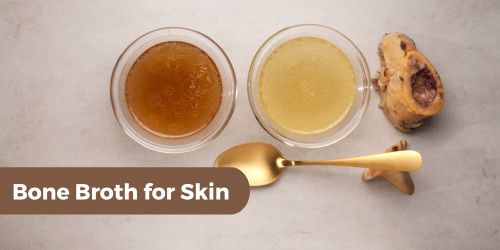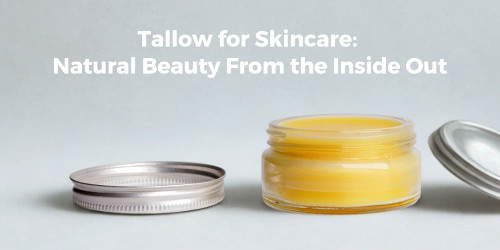Is Collagen Worth the Hype?
Collagen makes up a significant portion of our connective tissues, making it the most abundant protein in our body. The primary function of collagen is to provide strength, structure, and support to our skin, bones, tendons, ligaments, and cartilage. It plays a crucial role in maintaining skin elasticity, joint flexibility, and overall tissue integrity.
As we age, collagen production naturally declines, leading to joint problems, decrease in skin elasticity, signs of aging and potential tissue damage. In this article, we will explore what it is, what it does in your body, and whether collagen supplements are worth it.
What is collagen made of?
Collagen is composed of specific amino acids, forming a unique triple helix structure that gives it its strength and stability. Collagen is divided into several groups depending on the type of structures they form. By far there are 28 types of collagen and the most common types are Type 1, which comprises over 90% of the collagen in the human body, and Type 4.
The 5 Main Types of Collagen and what they do:
• Type I Collagen. This type makes up 90% of collagen in the human body. It is used to provide structure to your skin, bones, teeth, tendons and ligaments.
• Type II Collagen. This type is primarily found in cartilage. It gives strength and is essential to maintaining joint health.
• Type III Collagen. This type is found in muscles, arteries and organs. It provides support and elasticity to these tissues.
• Type IV Collagen. This type is found in the layers of your skin. Crucial for the formation of basement membranes, which are thin, sheet-like structures that separate and support the cells of various tissues and organs.
• Type V Collagen. This type is found in the cornea of your eyes, some layers of skin, hair and tissue of the placenta. It helps to regulate the assembly of type I collagen fibers and contributes to the stability and organization of tissues.
Shop collagen supplements online
Signs of Collagen Deficiency
1. Skin Aging - as we age, our collagen production decreases making skin less elastic, leading to formation of wrinkles, fine lines, and sagging skin.
2. Joint Problems - when type II collagen which is present in the cartilage diminishes, joint pain, stiffness, and an increased risk of developing conditions like osteoarthritis can occur.
3. Weak Bones - the lack of collagen can lead to weakened bones which increases the risk of fractures and osteoporosis.
4. Weak Muscles - reduced collage production can affect mobility and overall physical performance as your muscles may not function properly due to weakness.
5. Poor Wound Healing - Collagen loss prevents new tissue growth which impairs the healing process resulting in delayed wound healing.
What are the Sources of Collagen?
Collagen is naturally produced by the human body; however, collagen production reduces overtime. High-protein foods are one of the main sources. They contain amino acids that make collagen - glycine, proline, and hydroxyproline which helps in collagen production.
Here are some foods that will help boost Collagen production:
Top on the list is Beef Bone Broth. If you are looking to boost your Type I Collagen (the type of collagen that plays a big role in skin, hair and nail health) production, beef bone broth is the best way to go as it’s a great source of collagen type I.
Another great source of collagen is Chicken Skin. According to a 2019 study in Alternative Therapies in Health and Medicine, middle-aged women (39 to 59 years) took oral collagen supplements made from chicken cartilage, they improved their fine lines, wrinkles, crow's feet and skin elasticity.
Next on the line is Pork Bone Broth. Porcine, or pig, byproducts is also a rich source of collagen. It closely resembles human collagen, which is why it's often used in healthcare settings for skin, wound and tendon repair and reinforcement.
Fish. Fish collagen is concentrated in the bones, skin and scales. If you want to get the most collagen production, Sardines is a great option because you'll eat most or all of the fish. Other fishes, like salmon fillets—with the skin on and then eat the skin, you should get a little collagen boost from that, too.
Collagen-Infused Drinks. These are beverages with hydrolyzed collagen. It’s a supplement form of collagen called peptides which have been extracted from their original sources like chicken, beef, fish, etc. It can be added to your water, coffee, smoothies, and the like.
Other sources of collagen are poultry, meat, eggs, dairy, legumes, and soy, which contains amino acids. And citrus fruits, berries, leafy greens, bell peppers, and tomatoes, which are rich in vitamin C that is a requirement in collagen production.
Shop our wide variety of collagen supplements
Recommended dosages and side effects
• For skin wrinkles - 2.5 grams of hydrolyzed collagen type I and a mixture of types I and II have demonstrated benefits after 8 to 12 weeks.
• For joint pain - 40 mg of raw type-II collagen taken daily for 6 months or 2 grams of hydrolyzed type-II collagen for 10 weeks may help reduce joint pain.
• For bone health - Research is limited, but 5 grams of a hydrolyzed collagen sourced from cows helped increase bone density after 1 year in a single study.
• For muscle building - 15 grams taken within 1 hour after resistance training may help build muscle, though other protein sources are likely to have similar effects.
Conclusion
Collagen offers a wide range of potential benefits. From promoting skin health and joint function to supporting gut health. Scientific research may support the positive effects of collagen supplementation in various areas. However, it is important to consult with healthcare professionals before starting any supplementation regimen.
Sources:
- Cleveland Clinic. (2022). Are there different types of collagen? Retrieved from https://my.clevelandclinic.org/health/articles/23089-collagen
- NIH National Library of Medicine. (2023). Biochemistry, Collagen Synthesis. Retrieved from https://www.ncbi.nlm.nih.gov/books/NBK507709/
- Harvard School of Public Health. (n.d) Collagen The Nutrition Source. Retrieved from https://www.hsph.harvard.edu/nutritionsource/collagen/
- Eating Well. (n.d). Best Food to Eat for a Collagen Boost. Retrieved from https://www.eatingwell.com/article/7896640/best-foods-to-eat-for-a-collagen-boost/
- Healthline. (n.d). Do Collagen Supplements Work. Retrieved from https://www.healthline.com/nutrition/do-collagen-supplements-work#dosages















